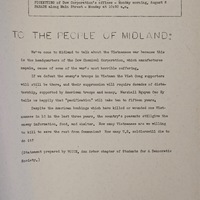Know the Opposition
Contrary to popular understandings of college students in the Vietnam era, young antiwar activists carried out their work in the face of considerable opposition among their peers. Indeed, the historian Jason S. Lantzer (2005) has argued that the 1960s were just as formative for campus conservatives as they were for campus progressives: "Though often viewed as an enigma by consensus liberals and neglected by commentators, the Right's ideas prompted a generation of activists who would, like their more widely recognized counterparts on the Left, recall their campus experiences as the cornerstone of an effective effort to reshape American politics and culture in the decades ahead" (p. 155). While many young citizens cut their political teeth in opposition to the Vietnam War, plenty of others learned useful lessons for future political organizing by showing their support for American foreign policy objectives during the war.
Throughout the Vietnam era, Young Americans for Freedom was the most influential intercampus organization for conservatives. Founded in September 1960 with support from commentator William F. Buckley, Jr., who had launched the conservative opinion magazine National Review a few years earlier, Young Americans for Freedom contributed a resolutely anticommunist voice to campus debates, competing with antiwar groups for social and political influence on campus and in the wider world (Lantzer 2005, p. 157).
Collective action to enact meaningful and lasting change cannot succeed in the absence of detailed knowledge about arguments raised by the opposition. Reflexive dismissiveness of adversarial considerations will mark a certain path to defeat. As such, members of Students for a Democratic Society in Ann Arbor did not keep their actions limited to pockets of like-minded supporters on campus. They reached out to the citizens of Midland, Michigan -- headquarters of the Dow Chemical Company, a leading producer of napalm -- in an attempt to win support for their cause at the very center of a presumed bastion of opposition.

